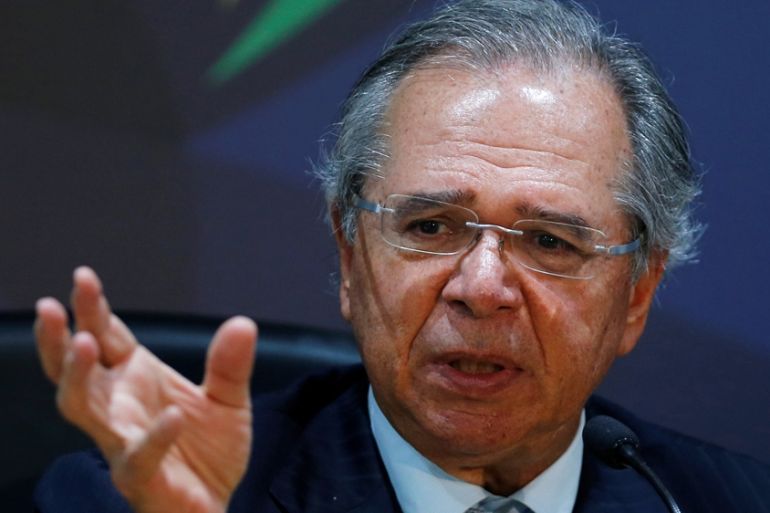Brazil outrage as minister references authoritarian AI-5 decree
The measure, invoked during the 1964 to 1985 dictatorship, permitted closure of Congress, censorship and torture.

Brazil‘s economy minister, referencing a draconian security measure used during the country’s nearly 20-year dictatorship, sparked outrage while warning against anti-government street protests.
Asked about the threat of protests seen in many parts of South America spreading to Brazil following the release of leftist ex-president Luiz Inacio Lula da Silva from prison, Economy Minister Paulo Guedes stressed he did not believe calling people to the streets was democratic.
Keep reading
list of 3 items‘I am back’: Fresh from prison, Lula greets supporters
Lula pledges to make life ‘hell’ for Bolsonaro’s gov’t
Guedes made the comment to reporters on Tuesday during a trip to Washington, DC.
“Is democracy only when your side wins? When the other side wins, after 10 months you convoke everyone to take to the streets? What kind of responsibility is that? Don’t be startled then if someone asks for an AI-5,” Guedes said, referring to a decree passed during the 1964 to 1985 dictatorship, which permitted the closing down of Congress as well as censorship and torture.
|
|
“AI-5” began trending worldwide on Twitter shortly after he made the comments.
Gleisi Hoffmann, leader of the leftist main opposition PT party, in a tweet, said Guedes “defends the use of AI-5” and a view of politics that “the people must suffer in silence”.
Dias Toffoli, the head of the Supreme Court, also came out against the comments saying the “AI-5 is incompatible with a democracy”.
“You do not build a future with the failed experiences of the past,” he said.
Looming political clash
Guedes later tried to walk back his comments, saying they were off the record. He then sought to clarify his position by saying the return of the decree would not happen.
“It’s inconceivable, Brazilian democracy would never have it, even if the left grabs its arms and breaks the Planalto Palace by force, it’s inconceivable,” he said, referencing the official presidential workplace.
The economy minister’s remarks come weeks after Lula was released from prison, setting off a political clash with right-wing President Jair Bolsonaro.
Lula has promised to unite the left to win the 2022 elections.
In October, Brazilian legislator Eduardo Bolsonaro, son of the president, suggested in an interview that his father’s government could consider issuing the toughest legal instrument from Brazil’s military dictatorship, the AI-5, if the left decided to radicalise.